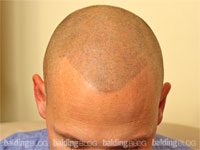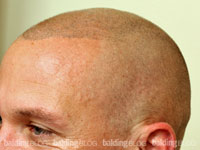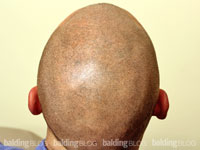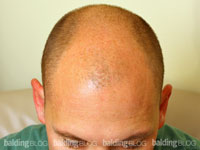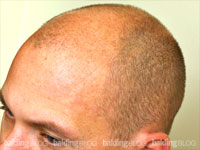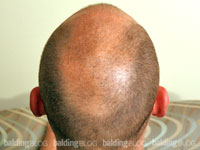New Hair Institute is pleased to introduce a new service we’re offering —
Scalp Micro-Pigmentation (SMP)
|
Like any tattoo process, the technique involves placing a special pigment into the skin of the scalp to mimic ‘hair follicles’ almost to the size of a closely cropped head of hair. Think 5 o’clock shadow or stubble. We have been using Scalp Micro-Pigmentation (SMP) for two purposes:
- As an alternative style for making a balding person look full headed with the placement of pigment into the scalp (example below)
- To camouflage the scars from a strip procedure or anywhere on the scalp. Almost any size scar can be treated with SMP (example will be posted in the coming weeks).
So what does it look like?
 This patient came in for a hair transplant consultation. He likes his hair cut close, so follicular unit extraction (FUE) would have been a reasonable way to get there without a detectable linear scar that traditional strip surgery would inevitably produce. The problem for him is that he needed somewhere between 4000-6000 grafts to cover the balding area. We routinely offer up to 1500 FUE grafts per session and recommend the strip technique for larger sessions. That means that he could have been looking at 2-5 FUE surgeries to obtain the final look he wanted and as he continued to bald, he might run out of donor hair before completing the final look he wanted. This patient was heading towards a Norwood class 7 pattern, and eventually he might need 6000-8000 grafts to follow the hair loss he would experience over time when/if his Propecia would stop producing the benefits he is now getting from the drug. As hair transplantation is a supply/demand process, would he have enough hair to complete the entire transplant process to a fully evolved Class 7 pattern? I doubt that he would.
This patient came in for a hair transplant consultation. He likes his hair cut close, so follicular unit extraction (FUE) would have been a reasonable way to get there without a detectable linear scar that traditional strip surgery would inevitably produce. The problem for him is that he needed somewhere between 4000-6000 grafts to cover the balding area. We routinely offer up to 1500 FUE grafts per session and recommend the strip technique for larger sessions. That means that he could have been looking at 2-5 FUE surgeries to obtain the final look he wanted and as he continued to bald, he might run out of donor hair before completing the final look he wanted. This patient was heading towards a Norwood class 7 pattern, and eventually he might need 6000-8000 grafts to follow the hair loss he would experience over time when/if his Propecia would stop producing the benefits he is now getting from the drug. As hair transplantation is a supply/demand process, would he have enough hair to complete the entire transplant process to a fully evolved Class 7 pattern? I doubt that he would.
The pictures below tell the rest of the story. He came in with his balding pattern and left the same day with a completely different look, certainly not a balding look.
AFTER SMP:
BEFORE:
I want to emphasize that this patient will have to maintain this short-clipped look unless he elects to have a hair transplant. The upside of this technique beyond what you see is the low maintenance he will have, just trimming his head about every other day. If he is against medication use (like Propecia) this style allows that choice, but as balding progresses as it inevitably will, touch-ups of the SMP technique will be needed. The downside of this is that the pigment is considered permanent, so the style must be acceptable for him and it is a lifetime decision.
This patient elected to do the process under local anesthesia to subdue whatever pain might be there during the procedure, but like any cosmetic tattoo procedure, it can be done without anesthesia. He may require one or two touch-ups to the look that he now has, as the pigment tends to fade a bit after the first session, but he does not have to look at repetitive surgeries into his future.
He’s been thrilled with the initial results. His overall comments to me reflected upon the freedom that his new look gives him and how much he loved rubbing his bald head. No more styling gels and repetitive worries about going bald have made him a happy man. He also knows that when hair cloning or hair multiplication become available (fingers crossed), he can just add the value these breakthroughs will give him, and maybe get him the hair that he wanted at some appropriate time in the future.
Over the next few months, we’ll show more of the work we have been doing with Scalp Micro-Pigmentation (SMP). Contact my office at 800-NEW-HAIR (or 310-553-9113) for pricing and availability.
—
Update: I answered a bunch of questions posed by our readers in the comments below.
Tags: scalp micro-pigmentation, smp, hairloss, hair loss, new hair institute




 This patient came in for a hair transplant consultation. He likes his hair cut close, so follicular unit extraction (FUE) would have been a reasonable way to get there without a detectable linear scar that traditional strip surgery would inevitably produce. The problem for him is that he needed somewhere between 4000-6000 grafts to cover the balding area. We routinely offer up to 1500 FUE grafts per session and recommend the strip technique for larger sessions. That means that he could have been looking at 2-5 FUE surgeries to obtain the final look he wanted and as he continued to bald, he might run out of donor hair before completing the final look he wanted. This patient was heading towards a Norwood class 7 pattern, and eventually he might need 6000-8000 grafts to follow the hair loss he would experience over time when/if his Propecia would stop producing the benefits he is now getting from the drug. As hair transplantation is a supply/demand process, would he have enough hair to complete the entire transplant process to a fully evolved Class 7 pattern? I doubt that he would.
This patient came in for a hair transplant consultation. He likes his hair cut close, so follicular unit extraction (FUE) would have been a reasonable way to get there without a detectable linear scar that traditional strip surgery would inevitably produce. The problem for him is that he needed somewhere between 4000-6000 grafts to cover the balding area. We routinely offer up to 1500 FUE grafts per session and recommend the strip technique for larger sessions. That means that he could have been looking at 2-5 FUE surgeries to obtain the final look he wanted and as he continued to bald, he might run out of donor hair before completing the final look he wanted. This patient was heading towards a Norwood class 7 pattern, and eventually he might need 6000-8000 grafts to follow the hair loss he would experience over time when/if his Propecia would stop producing the benefits he is now getting from the drug. As hair transplantation is a supply/demand process, would he have enough hair to complete the entire transplant process to a fully evolved Class 7 pattern? I doubt that he would. 